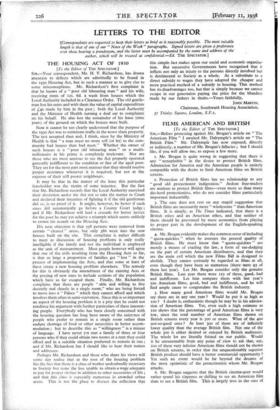LETTERS TO THE EDITOR
[Correspondents are requested to keep their letters as brief as is reasonably possible. The most suitable length is that of one of our " News of the Week" paragraphs. Signed letters are given a preferenie over those bearing a pseudonym, and the latter must be accompanied by the name and addriss Of the " author, which will be treated as confidential.—Ed. THE SPECTATOR.] THE HOUSING ACT OF 1930 [To the Editor of THE SPECTATOR.]
Sut,—Your correspondent, Mr. H. Y. Richardson, has drawn attention to defects which are admittedly to be found in the 1930 Housing Act, but in such a manner as to give rise to some misconceptions. Mr. Richardson's first complaint is that he knows of a " poor old labouring man " and his wife, receiving rents of 12s. 6d. a week from houses which the Local Authority included in a Clearance Order. The old gentle- man lost his rents and with them the value of capital expenditure of £40 made by him in the past ; both the Local Authority and the Minister of Health turning a deaf ear to complaints on his behalf. He also lost the remainder of his lease (nine years) of the ground on which the houses were built.
Now it cannot be too clearly understood that the purpose of
the 193o Act was to terminate traffic in the worst slum property. The test accepted then and, I think, since by the Ministry of Health is that " a man must no more sell (or let) to the com- munity bad houses than bad meat." Whether the owner of such houses is a " poor old labouring man " or a multi- millionaire in his prime is completely irrelevant. Nor are those who are most anxious to see the Act properly operated generally indifferent to the condition or fate of the aged poor. They are for the most part most anxious'that they should receive proper assistance whenever it is required, but not at the expense of their still poorer neighbours.
It may be that in the matter of the lease this particular leaseholder was the victim of some injustice. But the fact that Mr. Richardson records that the Local Authority exercised their discretion under the Act not to take the matter to Court and declared their intention of fighting it if the old gentleman did so, is no proof of it. It might, however, be better if such cases did automatically go before a County Court judge ; and if Mr. Richardson will lead a crusade for better justice for the poor he may yet achieve a triumph which seems unlikely to crown his assault on the Housing Acts.
His next objection is that 558 persons were removed from
certain " cleared " areas, but only 386 went into the new houses built on the site. This complaint is rather difficult to meet as discussion of housing problems is only really intelligible if the family and not the individual is employed as the unit of measurement. Most people however will agree that one of. the evils resulting from the Housing Acts so far, is that so large a proportion of families get " lost " in the process of implementing the Acts, and that some at least of these create a new housing problem elsewhere. The remedy for this is obviously the amendment of the existing Acts or the passing of new ones to include sections of the population . which have so far escaped them. Finally, Mr. Richardson complains that there are people " able and willing to live decently and cleanly in a single room," who are being forced to move into a " Palace " which they cannot afford and which involves them often in semi-starvation. Since this is so important an aspect of the housing problem it is a pity that he could not reinforce his argument with further particulars of these interest- ing people. Everybody who has been closely concerned with the housing question has long been aware of the existence of people who prefer to remain in a single room rather than endure shortage of food or other necessities in better accom- modation ; but to describe this as " willingness " is a misuse of language. I have never yet met a family of three or four persons who if they could obtain two rooms at a rent they could afford and in a suitable situation preferred to remain in one ; and if Mr. Richardson has I should like to hear their names and addresses.
Perhaps Mr. Richardson and those who share his views will some day realise that at the root of the housing problem lies the fact that there is a class of worker undoubtedly necessary to Society but none the less unable to obtain a wage adequate to pay for proper shelter in addition to other necessities of life ; and that this class is especially numerous in crowded urban areas. This is not the place to discuss the reflection that
this simple fact makes upon our social and economic organisa- tion. But successive Governments have recognised that it inflicts not only an injury to the persons directly involved but is detrimental to Society as a whole. As a substitute to a direct subsidy to wages they have adopted the cheaper and more practical method of a subsidy to housing. This method has its disadvantages too, but that is simply because we cannot escape in our generation paying the price for the blunders made by our fathers in theirs.—Yours faithfully, JOHN MARTIN.


















































 Previous page
Previous page